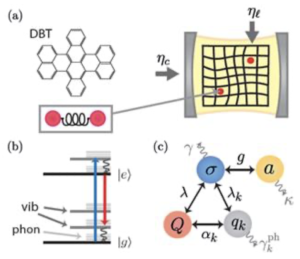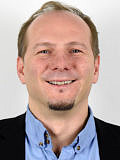D01 – Cooperative effects in coupled quantum emitter systems
Summary
Cooperative quantum behavior occurs naturally in dense ensembles of quantum emitters, where strong particle-particle interactions, such as near field dipole-dipole exchanges can compete with the collective coupling to confined bosonic optical modes. We develop theoretical methods, based on master equations and quantum Langevin equations, applicable to systems ranging from pure quantum emitters subject to disorder and decoherence to molecular ensembles where coupling of electrons to vibrons and phonons pose important challenges. Among others, we aim at specific applications in quantum information, quantum metrology and vacuum-modified material properties such as exciton, energy or charge transport.
Project Leaders
Claudiu Genes
Max Planck Institut für die Physik des Lichts
91058 Erlangen
- Phone number: +49 9131 7133622
- Email: claudiu.genes@mpl.mpg.de
Publications
2023
- , , , :
Linear optical elements based on cooperative subwavelength emitter arrays
In: Optics Express 31 (2023), p. 6003-6026
ISSN: 1094-4087
DOI: 10.1364/OE.476830 - , , , , , :
Theory of phase-adaptive parametric cooling
In: Physical Review A 107 (2023), Article No.: 053521
ISSN: 1050-2947
DOI: 10.1103/PhysRevA.107.053521 - , , :
Classical phase synchronization in dissipative non-Hermitian coupled systems
In: Physical Review A 108 (2023), Article No.: 023721
ISSN: 1050-2947
DOI: 10.1103/PhysRevA.108.023721
2022
- , , :
Cooperative Quantum Phenomena in Light-Matter Platforms
In: PRX Quantum 3 (2022)
ISSN: 2691-3399
DOI: 10.1103/PRXQuantum.3.010201
2021
- , , :
Perturbation theory of nearly spherical dielectric optical resonators
In: Physical Review A 104 (2021)
ISSN: 1050-2947
DOI: 10.1103/PhysRevA.104.023516 - , , , :
Molecular polaritonics in dense mesoscopic disordered ensembles
In: Physical Review Research 3 (2021)
ISSN: 2643-1564
DOI: 10.1103/PhysRevResearch.3.033141


